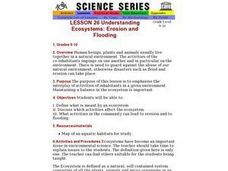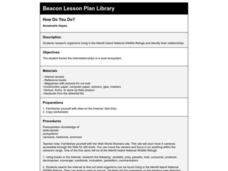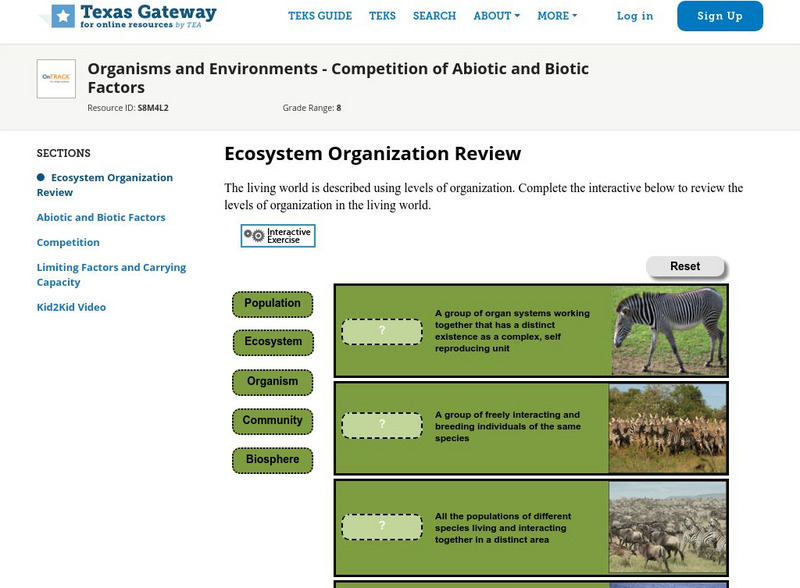Curated OER
Six Levels of Ecological Organization
Ninth graders describe the six levels of ecological organizations and give examples of each. They also differentiate between food chains and webs and identify trophic and consumer levels in food chain and food webs.
Curated OER
Outcomes Science 4: Earth & Beyond
In this earth and beyond science worksheet, students read through 11 pages of information on weather, global warming, climate change and other related topics. There are many website links on the pages that provide additional information...
Curated OER
Understanding Ecosystems: Erosion and Flooding
Students study the balance in the environment needed for ecosystems. They discuss what can lead to erosion and flooding.
Curated OER
Make Sense of Nature
Students participate in this program that heightens their awareness and curiosity of nature as well as their sense of adventure and exploring new surroundings. They identify and choose an object from nature after exploring it with other...
Curated OER
Science Word Search
In this literacy worksheet, middle schoolers find the words that are related to the concepts that are the theme of the word search. New vocabulary is the focus of the puzzle.
Curated OER
The Portable Niche
Third graders, in groups, research animals, plants, and conditions found in ecosystems.
Curated OER
How Do You Do?
Seventh graders research organisms in the Merritt Island National Wildlife Refuge. They create a picture book demonstrating their understanding of relationships.
Utah Education Network
Uen: Lesson Plan: Biotic and Abiotic Factors
This site provides a detailed lesson plan to help students grasp the concepts of biotic and abiotic. Background information is provided for the teacher and plans are given for two days.
That Quiz
That Quiz: Biotic or Abiotic? Living or Non Living?
This fun quiz has you choose between different images to decide whether it is biotic or abiotic. It also gives examples through illustrations of abiotic and biotic things.
Other
Digital Library for Earth System Education: Teaching Box: Seasonal Upwelling
A suite of lessons focusing on the process of upwelling. Inquiry-based exploration of seasonal upwelling includes marine food webs, food production in the ocean, wind-driven ocean currents, and seasonal changes in biotic and abiotic...
National Geographic
National Geographic: Symbiotic Relationships in Marine Ecosystems
In this lesson students analyze videos to make observations about species, populations, and communities of organisms and discuss their symbiotic relationships. Then they create a hypothetical marine ecosystem and describe the adaptive,...
Encyclopedia of Earth
Encyclopedia of Earth: Ecology: Abiotic Factor
Explains what an abiotic factor is, and discusses each of six types and their roles in ecosystems and habitats. (Published: July 31, 2010)
Oswego City School District
Regents Exam Prep Center: Biotic vs. Abiotic
This NY Regents prep site provides a nice overview of what abiotic and biotic factors of an ecosystem are, as well as a brief description of carrying capacity.
Texas Education Agency
Texas Gateway: Competition of Abiotic and Biotic Factors
This tutorial explores abiotic and biotic factors with videos and interactive activities.
National Geographic
National Geographic: Ocean Abiotic Factors
After looking at examples of biotic and abiotic factors in ecosystems, students focus on abiotic factors in marine ecosystems, the physical processes that are involved, and the impact human activities can have on these. Includes handouts...
Other
Abiotic Factors
Abiotic components are the nonliving components of the biosphere. Chemical and geological factors, such as rocks and minerals, and physical factors, such as temperature and weather, are referred to as abiotic components.
TeachEngineering
Teach Engineering: How Fast Can a Carrot Rot?
Students conduct experiments to determine what environmental factors favor decomposition by soil microbes. They use chunks of carrots for the materials to be decomposed, and their experiments are carried out in plastic bags filled with...
Scholastic
Scholastic: Study Jams! Science: Ecosystems
A video and a short multiple-choice quiz on the topic of ecosystems, covering biotic and abiotic factors, and the roles organisms play in an ecosystem.
Utah Education Network
Uen: Habitat Alterations of a Riparia
This field trip is designed to physically immerse students in the concept of habitat alteration focusing on biotic and abiotic habitat alterations.
Texas Instruments
Texas Instruments: Glencoe Middle School Science: Biodiversity and Ecosystems
Students will conduct a field investigation to learn about the environment. They will observe biotic and abiotic factors of an ecosystem. Students can use the CBL 2 and a temperature probe to collect data and a graphing calculator to...
Khan Academy
Khan Academy: What Is Ecology?
A webpage giving an overview of ecology. Learn about the biotic and abiotic factors that make up an ecosystem as well as the different levels of ecology.
BBC
Bbc: Gcse Bitesize: Adaptations, Interdependence and Competition Aqa
The abundance and distribution of organisms in an ecosystem is determined by biotic and abiotic factors. Animals and plants have adaptations to allow them to compete for resources.
PBS
Pbs Learning Media: River Rewilding: Advanced Water Quality
In this unit, students will try to improve stream quality and reduce human impacts by taking action.This Advanced Water Quality unit is packaged into three smaller parts: Part 1: Stream Habitat Assessment; Part 2: Macroinvertebrate...
Texas Education Agency
Texas Gateway: Abiotic and Biotic Factors in an Ecosystem
Do you know the difference between abiotic and biotic factors? This tutorial explores both these factors and their importance in the ecosystem.
Other popular searches
- Abiotic and Biotic Factors
- Abiotic and Biotic
- Abiotic Biotic
- Abiotic Biotic Environment
- Abiotic and Biotic Elements
- Abiotic and Biotic Resources
- Abiotic Biotic Factors
- Abiotic Biotic Lab
- Ecosystems Abiotic Biotic
- Biotic Abiotic Pictures
- Biotic Abiotic Piotures
- Biotic or Abiotic Changes






















